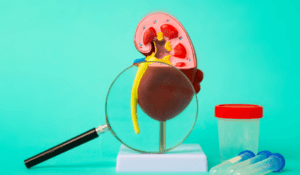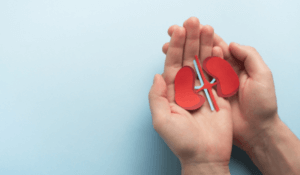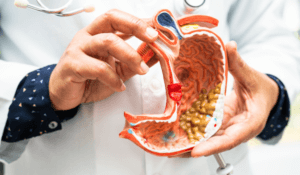 March is National Kidney Month, a time to focus on kidney health. In 2025, National Kidney Month will center around the theme “Know Your Kidneys: The Path to Prevention.” The campaign encourages people to understand how the kidneys work, the conditions that can harm them, and the habits that can keep them healthy. Raising awareness can also help with early diagnosis, which can improve the health outcomes of patients with chronic kidney disease.
March is National Kidney Month, a time to focus on kidney health. In 2025, National Kidney Month will center around the theme “Know Your Kidneys: The Path to Prevention.” The campaign encourages people to understand how the kidneys work, the conditions that can harm them, and the habits that can keep them healthy. Raising awareness can also help with early diagnosis, which can improve the health outcomes of patients with chronic kidney disease.
National Kidney Month began in the 1970s, and it was created by the National Kidney Foundation to highlight what was, at the time, the growing problem of kidney disease in the United States. Since then, it has grown into a national campaign, bringing together organizations, healthcare professionals, and communities in support of taking good care of these vital little organs.
What exactly do the kidneys do?
A person’s kidneys are about the size of fists, and these small, bean-shaped organs are essential for staying healthy.
- Every day, the kidneys work nonstop filtering waste from up to 200 quarts of blood. They remove waste and extra fluid, creating one to two quarts of urine, while sending clean, filtered blood back into the body.
- Each kidney contains about a million tiny filters called nephrons. These nephrons clean the blood by removing waste and extra fluid. The waste is turned into urine, which moves to the bladder and is later passed out of the body.
- The kidneys selectively remove waste from the body while keeping minerals like potassium in the blood. They send clean, filtered blood with these nutrients back into the body.
- The kidneys also help manage blood pressure by either changing the amount of fluid in the blood or producing a hormone that makes blood vessels tighten.
- The kidneys make a hormone called erythropoietin, which tells the bone marrow to produce more red blood cells.
- Vitamin D helps keep bones healthy by working with calcium and phosphorus. The kidneys help to activate vitamin D so the body can use it. They also help maintain the right balance of key electrolytes, like sodium, potassium, and phosphate.
- The body produces acid as cells break down. Some foods can raise or lower the amount of acid in the body. The kidneys play a role in regulating these acid levels to maintain a healthy balance.
What happens in kidney disease?
Kidney disease happens when the kidneys stop working properly, causing waste to build up in the body. Over time, this can lead to serious health problems. In its most advanced form, it’s called kidney failure, which is the final stage of kidney disease.
Acute kidney disease happens when the kidneys stop working correctly but recover within a few months. Chronic kidney disease is when the kidneys lose normal function and don’t improve for longer than a few months.
Chronic kidney disease (CKD) has five stages, starting with Stage 1, which is the mildest and often has no clear symptoms. Over time, it gets worse and can lead to kidney failure in the later stages. Chronic illnesses like diabetes and heart disease are common causes of kidney damage.
Over time, chronic kidney disease can lead to kidney failure. When this happens, the kidneys can no longer filter the blood, so treatments like dialysis are needed several times a week to do the job. In some cases, a kidney transplant may be necessary.
What are the risk factors for chronic kidney disease? 
About one in three adults with diabetes and one in five adults with high blood pressure may develop chronic kidney disease. Other factors that increase the risk of CKD include heart disease, being overweight or obese, having a family history of kidney disease, or experiencing kidney infections. Physical injuries to the kidneys can also lead to kidney disease.
Individuals with diabetes and high blood pressure can lower their risk of developing chronic kidney disease by using medications that help control blood sugar, such as Ozempic, and using medications and making lifestyle changes that can help control blood pressure.
People can also inherit the condition called Polycystic Kidney Disease (PKD), which is a genetic disorder in which there is a growth of numerous fluid-filled cysts in the kidneys. These cysts gradually enlarge and can damage the kidneys, leading to progressive loss of kidney function.
How is kidney disease tested?
Urine Tests
Protein in the urine, known as proteinuria, is an early sign of kidney disease. Doctors can detect it through urine tests, like the dipstick test. This test uses a chemically treated strip that changes color if protein levels are higher than usual. While it doesn’t measure the exact amount of protein, it shows if levels are in the normal range. Abnormal results may lead to further testing.
The urine albumin-to-creatinine ratio (UACR) test measures how much albumin is in the urine compared to creatinine. A result of 30 or higher may indicate kidney disease and might need to be repeated to confirm accuracy. For those with kidney disease, tracking albumin levels helps doctors monitor treatment. Stable or lower levels mean the treatment is working.
Blood tests
Blood tests like serum creatinine tests help evaluate kidney function by measuring how well the kidneys remove waste, toxins, and extra fluid. High creatinine levels can signal kidney problems. Normal levels vary by age, gender, and muscle mass, but generally, levels above 1.2mg/dl for males and 1.0mg/dl for females may indicate an issue.
Glomerular filtration rate (GFR)
The GFR blood test measures how well the kidneys filter waste from the blood. A GFR of 60 or higher is normal if the urine albumin test is also normal, but follow-up with a doctor is essential. A GFR below 60 may indicate kidney disease, requiring medical advice and treatment. A GFR below 15 suggests kidney failure, possibly needing dialysis or a transplant. If GFR stays under 20 for 6-12 months, a transplant may be recommended.
Blood urea nitrogen (BUN)
A BUN test measures the level of urea nitrogen in the blood, a waste product from breaking down protein. The kidneys filter urea nitrogen out of the blood and remove it through urine, keeping BUN levels in the normal range of 7 to 20. Higher BUN levels may signal kidney problems, as these levels often rise with worsening kidney function.
Other tests
Doctors may run additional tests to evaluate kidney health. These might include checking blood pressure, using imaging scans, or doing a kidney biopsy.
What are some things I can do to take care of my kidneys?

Kidney disease often has no noticeable symptoms, so many people may not realize that there’s something wrong with how their kidneys work. Those at risk for CKD should schedule regular tests with their healthcare practitioner and discuss the recommended testing frequency with their doctor. For individuals with diabetes, annual testing is particularly important, as is keeping blood sugar levels as close as possible to their target range.
For those with high blood pressure, regular monitoring and proper management are critical to protecting kidney health. Doctors can provide advice on medications that may affect the kidneys and suggest other ways to lower blood pressure.
Maintaining healthy kidneys throughout life involves taking a few key steps:
Stay hydrated, but avoid overdoing it. While it’s essential to drink enough water daily, consuming more than the recommended four to six glasses per day is unlikely to make your kidneys work any better.
Maintain a healthy diet. Many kidney issues are caused by other health problems like high blood pressure, diabetes, or heart disease. It is often recommended that healthy eating habits be adopted to manage weight and blood pressure. By preventing conditions like diabetes or high blood pressure, individuals can help protect their kidney health.
Regular exercise. Just like a balanced diet, staying active can help prevent weight gain and lower the risk of high blood pressure. However, people should be careful not to push themselves too hard, especially if they’re not used to exercising. For anyone in this category who wants to start working out, it’s recommended to consult a doctor first to ensure the exercise plan is safe.
Quit smoking and vaping. Smoking harms blood vessels, reducing blood flow to the kidneys, which prevents them from working properly. It also raises the risk of high blood pressure and kidney cancer. While vaping might avoid some of the harmful chemicals in tobacco smoke, it still contains nicotine, which is highly addictive and can harm the body. Vaping liquids also often include other chemicals that can be dangerous.
Pain medications should be used with caution. Common drugs like Nurofen and Naprosyn (NSAIDs) can harm the kidneys if taken too often over a long period. While occasional use for minor pain is generally safe for people with healthy kidneys, regular use for chronic conditions like arthritis may increase the risk of kidney damage. Those who rely on these medications for ongoing pain should consult their doctor to monitor kidney health or explore other pain management options.
Test regularly. Individuals at risk should undergo regular kidney function tests. People with diabetes, high blood pressure, or heart disease should have their kidney health monitored as part of their standard medical care.
Overall, the best way to protect your kidneys is by maintaining a healthy lifestyle, which helps lower the risk of diseases that can harm kidney function. This means eating nutritious foods, staying active, and managing weight. These habits aren’t just good for kidneys; they benefit overall health, and healthy kidneys thrive in a healthy body!
FAQs
What color is urine when your kidneys are failing?
Dark amber, red, or brown urine could be a sign of kidney failure. However, dark-colored urine doesn’t always mean there’s a kidney problem. For example, dark yellow urine is often a sign of dehydration.
Does lemon water flush your kidneys?
Staying hydrated helps remove waste from the kidneys. Drinking lemon water can support this by providing citrate, which might lower the chances of kidney stones. However, while lemon water can be helpful, too much can also be harmful, so plain water should still be the main source of hydration to let the kidneys work at their best.
Can damaged kidneys work normally again?
It depends on the cause of the kidney dysfunction and the management and treatment. Acute kidney failure happens when your kidneys stop working suddenly, usually over a few hours or days. Most people recover quickly, but in some cases, it can cause lasting damage and lead to chronic kidney disease. Chronic kidney disease develops slowly over months or years and causes permanent damage to the kidneys. If it worsens, it can eventually lead to kidney failure.
What are some signs your kidneys are struggling?
Signs of decreased kidney function can include: high blood pressure, changes in urination frequency or appearance (such as foamy urine), blood in the urine, swelling in the legs, ankles, or around the eyes, pain near the kidneys, fatigue, loss of appetite, trouble sleeping, headaches, difficulty concentrating, itching, shortness of breath, nausea, vomiting, bad breath, a metallic taste, muscle cramps, or tingling in the fingers and toes.

















